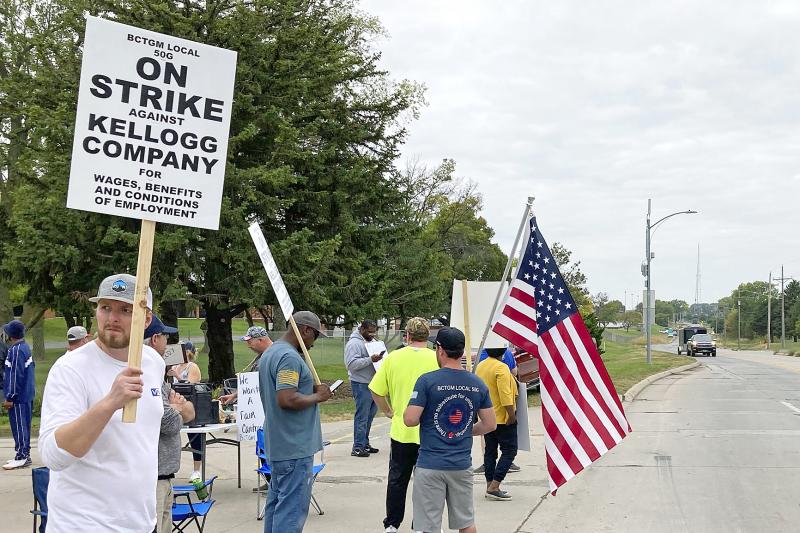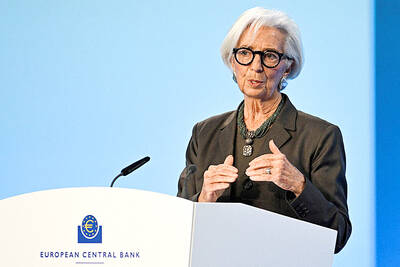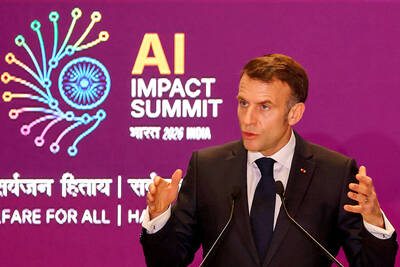A summer of labor unrest at US food manufacturers has stretched into fall, as COVID-19 pandemic-weary workers continue to strike for better pay.
About 1,400 workers at Kellogg Co’s US cereal plants walked off the job this week, saying negotiations with the company regarding pay and benefits are at an impasse. Meanwhile, in Kentucky, a strike by 420 workers against Heaven Hill Distilleries Inc is in its fourth week.
The actions come on top of strikes earlier this summer by 600 workers at a Frito-Lay plant in Topeka, Kansas, and 1,000 workers at five Nabisco Inc plants across the US. In June, Smithfield Foods Inc narrowly avoided a strike by thousands of workers at a plant in Sioux Falls, South Dakota.

Photo: AP
The number of actions is unusual. Kellogg says this is the first time its US cereal workers have gone on strike since 1972. Nabisco workers last walked off the job in 1969.
However, after a difficult 18 months, which saw many workers putting in 12-hour shifts and mandatory overtime to meet pandemic demand, employees are in no mood to compromise.
“We’re drawing a line in the sand,” said Rob Long, a production mechanic who has worked at Kellogg’s Omaha plant for 11 years. Kellogg workers are also striking in Michigan, Pennsylvania and Tennessee.
Long said he and others are upset about a two-tiered system of employees that gives fewer benefits and less pay to newer workers, creating a wedge within the ranks. Long said the company wants to eliminate a provision that currently caps the lower tier of workers at 30 percent of the workforce.
After decades of watching companies chip away at pay and benefits, food workers sense that they have a rare upper hand in the wake of the pandemic, said Patricia Campos-Medina, executive director of The Worker Institute at ILR Cornell.
Labor shortages mean companies cannot easily find replacements for food-production workers, she said. The pandemic has also put a spotlight on the essential, and sometimes dangerous, nature of their work.
“Workers in general are demanding that companies invest more in the workforce and not just use the profits for the shareholders,” she said.
Campos-Medina said the trend is not only happening with unionized workers such as those at Kellogg, who are members of the Bakery, Confectionery, Tobacco Workers and Grain Millers Union. Non-union fast food workers have walked off the job in dozens of US cities seeking a US$15 minimum wage. Workers at three Starbucks Corp stores in Buffalo, New York, are trying to unionize.
Kris Bahner, Kellogg senior vice president for global corporate affairs, said that the company’s compensation and benefits are already among the industry’s best. Kellogg, which is based in Battle Creek, Michigan, said its longer-term employees made an average of US$120,000 last year and US$118,000 in 2019, and its proposed contract would shift newer workers to those higher wages over six years.
“We are disappointed by the union’s decision to strike,” she said.
Kellogg began negotiating a new four-year contract on Sept. 8.
However, workers on the picket line in Omaha said they are routinely working 74 to 84-hour weeks to earn that money. Some workers said they have endured 12-hour shifts seven days per week throughout the pandemic, with only a few minutes’ notice about mandatory overtime.
“We do make good money, but we’ve given up a lot,” said Dan Jourdan, a packing machine operator who has worked at Kellogg since 2001. “If we worked just 40 hours a week, we’d make nowhere near that kind of wage.”

European Central Bank (ECB) President Christine Lagarde is expected to step down from her role before her eight-year term ends in October next year, the Financial Times reported. Lagarde wants to leave before the French presidential election in April next year, which would allow French President Emmanuel Macron and German Chancellor Friedrich Merz to find her replacement together, the report said, citing an unidentified person familiar with her thoughts on the matter. It is not clear yet when she might exit, the report said. “President Lagarde is totally focused on her mission and has not taken any decision regarding the end of

French President Emmanuel Macron told a global artificial intelligence (AI) summit in India yesterday he was determined to ensure safe oversight of the fast-evolving technology. The EU has led the way for global regulation with its Artificial Intelligence Act, which was adopted in 2024 and is coming into force in phases. “We are determined to continue to shape the rules of the game... with our allies such as India,” Macron said in New Delhi. “Europe is not blindly focused on regulation — Europe is a space for innovation and investment, but it is a safe space.” The AI Impact Summit is the fourth

CONFUSION: Taiwan, Japan and other big exporters are cautiously monitoring the situation, while analysts said more Trump responses ate likely after his loss in court US trading partners in Asia started weighing fresh uncertainties yesterday after President Donald Trump vowed to impose a new tariff on imports, hours after the Supreme Court struck down many of the sweeping levies he used to launch a global trade war. The court’s ruling invalidated a number of tariffs that the Trump administration had imposed on Asian export powerhouses from China and South Korea to Japan and Taiwan, the world’s largest chip maker and a key player in tech supply chains. Within hours, Trump said he would impose a new 10 percent duty on US imports from all countries starting on

STRATEGIC ALLIANCE: The initiative is aimed at protecting semiconductor supply chain resilience to reduce dependence on China-dominated manufacturing hubs India yesterday joined a US-led initiative to strengthen technology cooperation among strategic allies in a move that underscores the nations’ warming ties after a brief strain over New Delhi’s unabated purchase of discounted Russian oil. The decision aligns India closely with Washington’s efforts to build secure supply chains for semiconductors, advanced manufacturing and critical technologies at a time when geopolitical competition with China is intensifying. It also signals a reset in relations following friction over energy trade and tariffs. Nations that have joined the Pax Silica framework include Japan, South Korea, the UK and Israel. “Pax Silica will be a group of nations